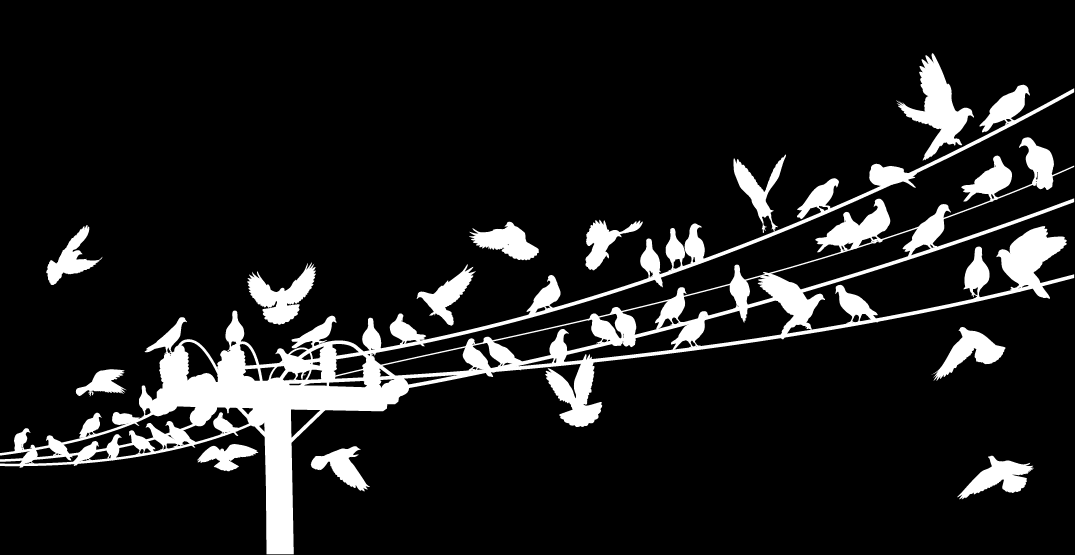Azad Sparks: Inclusive Armenian Organizing with Carene Mekertichyan
Written by Araxie Cass
26 October 2022
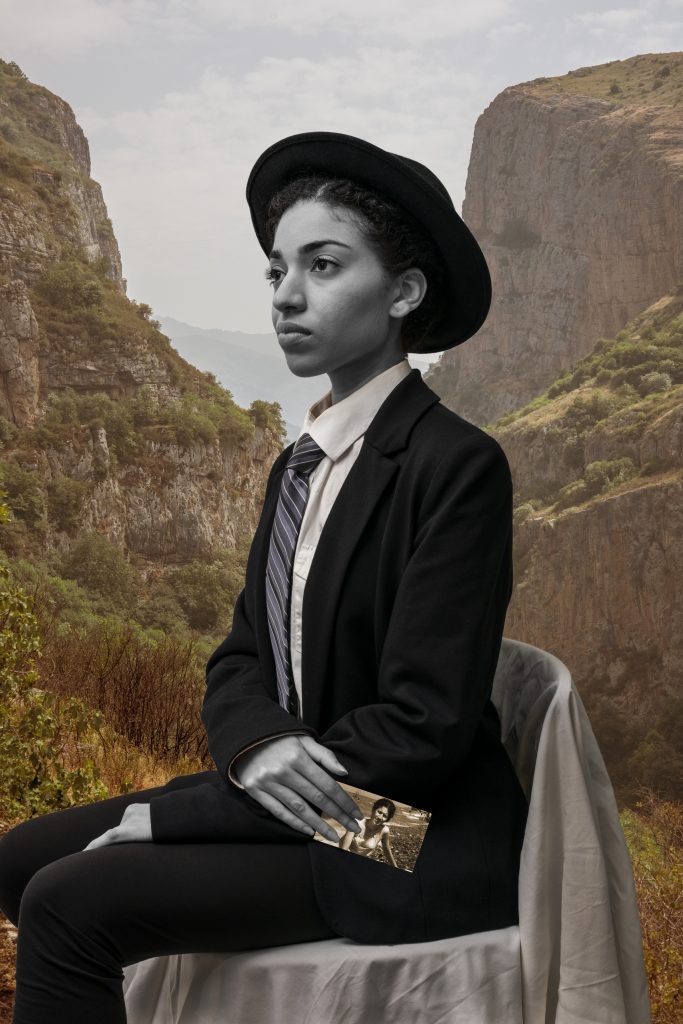
This article is part of Azad Sparks: Critical Conversations for the Armenian Community. Azad Sparks is an interview series dedicated to starting transnational conversations on the topics that aren’t often talked about in prevailing Armenian discourse. Here we ask the difficult questions, break the silence on marginalized topics, and build alternative communities.
Carene Mekertichyan is an artist, organizer, educator in Los Angeles. She organizes people for intersectional justice in various arts spaces and online through her platform on Instagram. She is one of the co-founders of Yerazad coalition, an action coalition dedicated to Armenian liberation and building transnational solidarity. Inspired by Carene’s efforts to build inclusivity in the Armenian community, I sat down with her to learn more about her activism, organizing work, and Armenian experience.
Note: This interview was conducted in September of 2021, may not reflect current events and actions.
Araxie Cass: I first found you on Instagram through the daily list of action items that you post, and I think it’s amazing that you keep it up every single day. How did you come to start those?
Carene Mekertichyan: The action items are ways that you can make a difference from wherever you are, even if you’re at home. I started creating those action item lists in June of 2020, when people in the popular discourse finally started to realize that the United States is systemically racist and white supremacist. There were a lot of people who were suddenly posting black squares and sharing some resources or going to protests and taking their selfies. But very quickly after those first couple of weeks I noticed people sliding back into their normal daily routine. These things were still and are still happening, because it’s a systemic issue and it takes sustained efforts to try and combat all of this.
I didn’t know the action items would be something I was going to do every day for more than two years now. But I had gotten a lot of engagement on my account after I did an email campaign to get no-knock warrants banned in Louisville, Kentucky, in the name of Breonna Taylor. So I thought, okay, how can I provide a resource to just keep people doing little things every day? I always like to say that no action is too small. So I made a very quick list of things that people could do that wasn’t too overwhelming.
AC: It’s such an important resource and it’s amazing that you’ve managed to do it for so long. Have you always been involved in activist work?
CM: Yeah, as long as I was old enough and able to. The first protest I ever went to was when I was around eight or nine. I went to a march downtown with my mom and her friends to protest the U.S.’s wars in Iraq and Afghanistan. Then afterwards we were flyering and putting up signs in our neighborhood in Silverlake, Los Angeles.
From a young age, I was very outspoken. I was one of those girls who in school would be called bossy, though now I understand how gendered that was. In elementary school, one of my friends was being mean soI got everyone to sign a petition saying something like hey you’re being mean, you need to chill out.
AC: So you’ve been doing petitions since day one.
CM: Yeah, activism is something that I’ve always been a part of and I’ve always been passionate about, whether it’s for my communities—the Black community and Armenian community—or whether it’s to try and dismantle all of the racism, white supremacy and specifically anti-Blackness within our theater institutions, which is something that I’ve been working a lot on recently. My parents always made sure that I knew where I came from, and I knew what my ancestors went through. It’s always felt like a duty that I have to my ancestors to keep trying to make things better for our future generations.
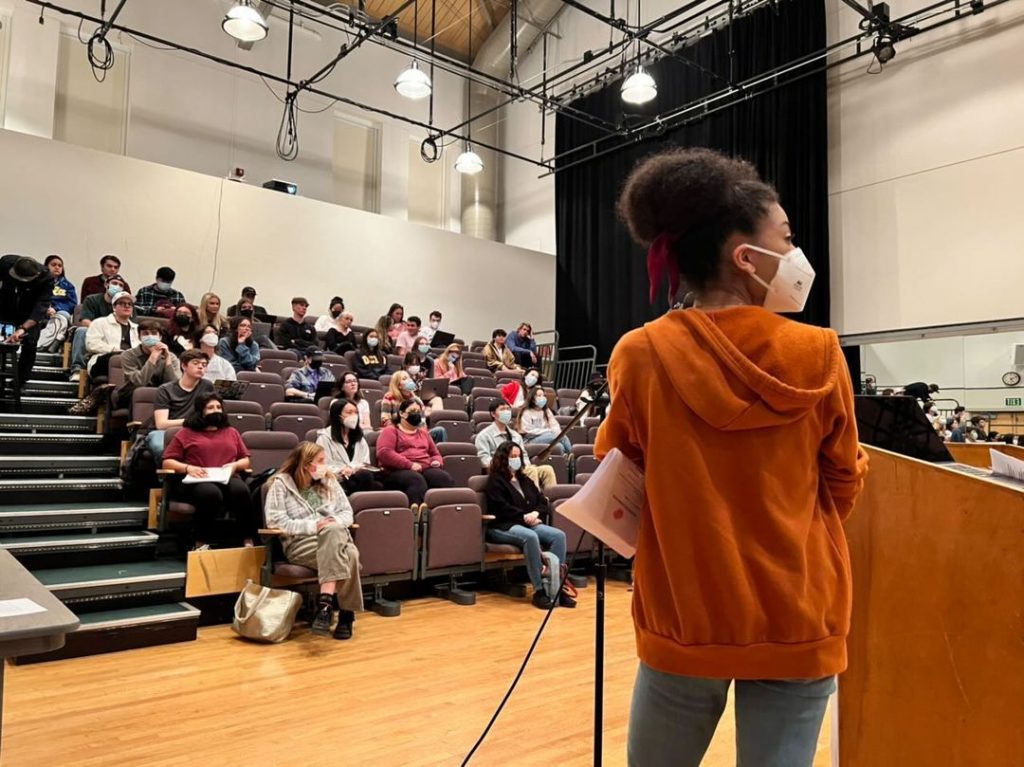
AC: That’s so important. Did you feel like you’re a part of both the Black and Armenian communities growing up?
CM: Growing up, I definitely felt more unconditionally accepted by the Black community. My Blackness was never questioned. There were always family members who would make ignorant comments about me being light skinned, but as someone who’s mixed race and light-skinned I benefit, unfortunately, from a lot of privileges in society.
In the Armenian community, within my family I always felt loved and accepted. But when I would go places with my parents in Glendale we would always get looks. There were also certain comments my family members made that weren’t trying to be hurtful, but were. I remember specifically, when I was graduating high school, I mentioned that I was really proud because I was the only Black student in my high school that made it into our top GPA tier. Then one of my aunts said something like, “Don’t say that! you’re not [Black]”,as if I had insulted myself. I could tell she felt bad and she didn’t mean it that way, but sometimes navigating little moments like that can be frustrating.
I never dealt with the very vicious Armenian racism until I had a public profile. Outside of my family I didn’t interact much with the Armenian community as a whole. I knew that there was racism in our community, but it had never been so targeted at me by strangers. During the 2020 war in Artsakh, I, like a lot of other people, got death threats and rape threats from Turkish and Azeri bots. But it didn’t feel personal because a lot of times they follow the script and it’s just a scare tactic that they’re sending to a bunch of people.
But the most horrible messages that I got and I still get are from Armenian men. Especially whenever I’m unapologetic about my Blackness and I talk about white supremacy in this country, and of our police force, or when I’m talking about my allyship to the LGBTQ+ community, I get a lot of hate. And I get those things from individuals; it’s not random spam. So that makes it more personal and sinister.
It’s something that we need to keep talking about. Because if we pretend it’s not real and we don’t condemn it when it happens, it is never going to change.
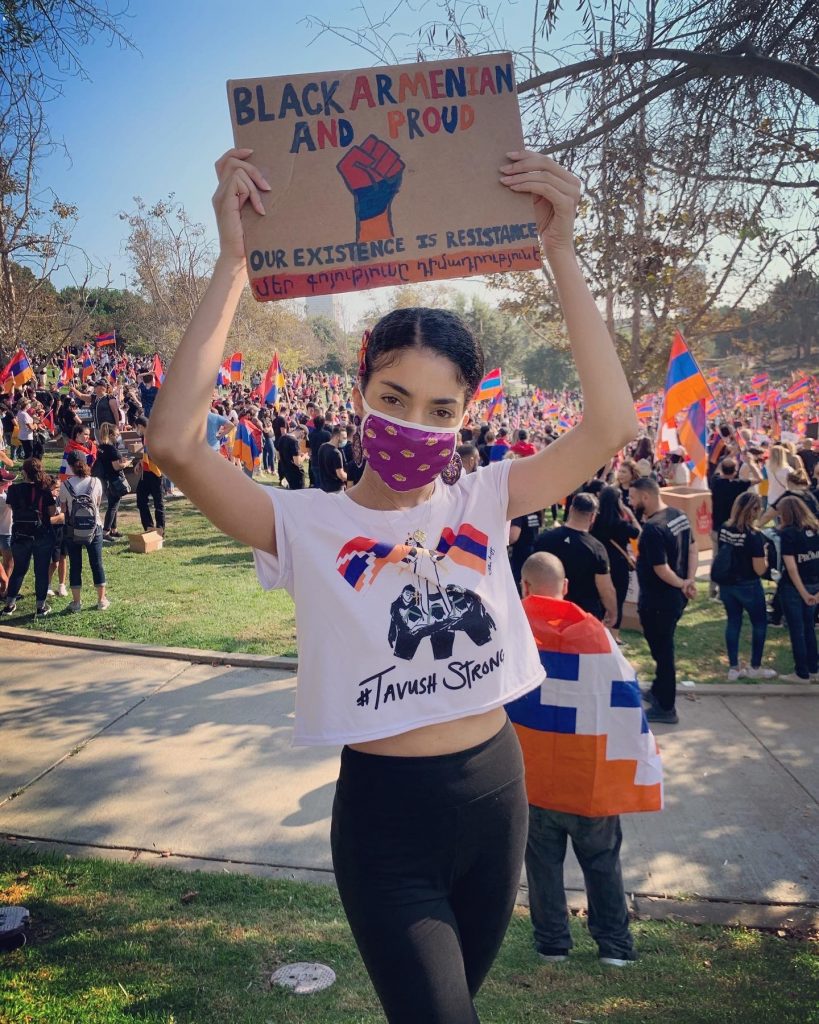
AC: Most definitely. One thing I’ve been thinking about a lot is the way that whenever we talk about these things, we get people saying that we need to unify as an Armenian community. Do you have any thoughts on how we can come together as a community in a way that’s actually healthy and that’s not just accepting harmful and problematic behavior in our community?
CM: Yeah, I get that a lot. There are so many “leaders” in our community who have greatly disappointed me. They tend to have an idea of unity centered on Armenians who are not mixed race, who are cisgender, and heterosexual. To be a leader in our community, you have to support everyone in it.
When we’re talking about true unity, it needs to include all Armenians. And that means Armenians who may not fit into stereotypes of “Armenianness.” There are a lot of people you may not even know because they’ve dealt with so much hurt and racism within the Armenian community that they don’t want to engage with it. We shouldn’t have to overcompensate to be considered Armenian and to be valued.
AC: You’ve spoken a lot about building solidarity in your organizing work, so I wanted to ask you about your work with Yerazad Coalition. How did you come to start it, and what has that process been like?
CM: We officially launched on Martin Luther King Day of 2021, but we started meeting in October of 2020. Joel Weisel reached out to me and a handful of other people who all align with this open-minded, progressive vision for a safe space, that would be open to all Armenians regardless of sexual orientation, identity, citizenship status, and ability. We also envisioned a space that would be centered on solidarity and building these coalitions of support.
At the time, there were a lot of people saying things like, “Our protests are so clean, we’re so respectful, we collaborate with the police…” while also using tactics like blocking the freeway that had come from Black Lives Matter. I was very frustrated because I have a lot of friends and connections and people who I work with who are not Armenian, and a lot of people were wondering why they were supposed to support us when it was something to do with Trump. Obviously, these people were also lazy and didn’t want to do any of their own research about the issue, but that’s what people were seeing—they were seeing Armenians with Trump flags everywhere at all of our protests, and were very confused. Also, there are a lot of people who are Black and Latinx who have dealt with racist Armenians here in Los Angeles.
People have not necessarily seen that solidarity and love from our community. And obviously, that is not most of us; that is just a few awful, horrible people. But we have to acknowledge it. We have to build up those connections. So we wanted Yerazad to be an organization that was going to genuinely show up for other communities without expecting anything.
We’re also focused on building transnational solidarity, making sure that we are linking our struggle for our survival and our indigenous land to the struggles that indigenous people are facing all around the world, to the struggles that Black people are facing here, and other places in the world, to all of the collective struggles of marginalized people, and showing up for those marginalized people.
We’ve had flier campaigns that were specific to Armenia and Artsakh, but we’ve also had flier campaigns for the Asian community, for Palestinians, and for the Afghan community. All of the flyers that we have will say, Armenians for Afghanistan or something that shows they’re specifically from our community. And I remember when we had put up stop AAPI hate fliers in Glendale, there was an Asian man who saw it and posted it and tagged Yerazad. He said something like, “It’s been a difficult week because I was in the thick of it when there were so many of these attacks happening but seeing this here on my morning walk really made me feel seen.”
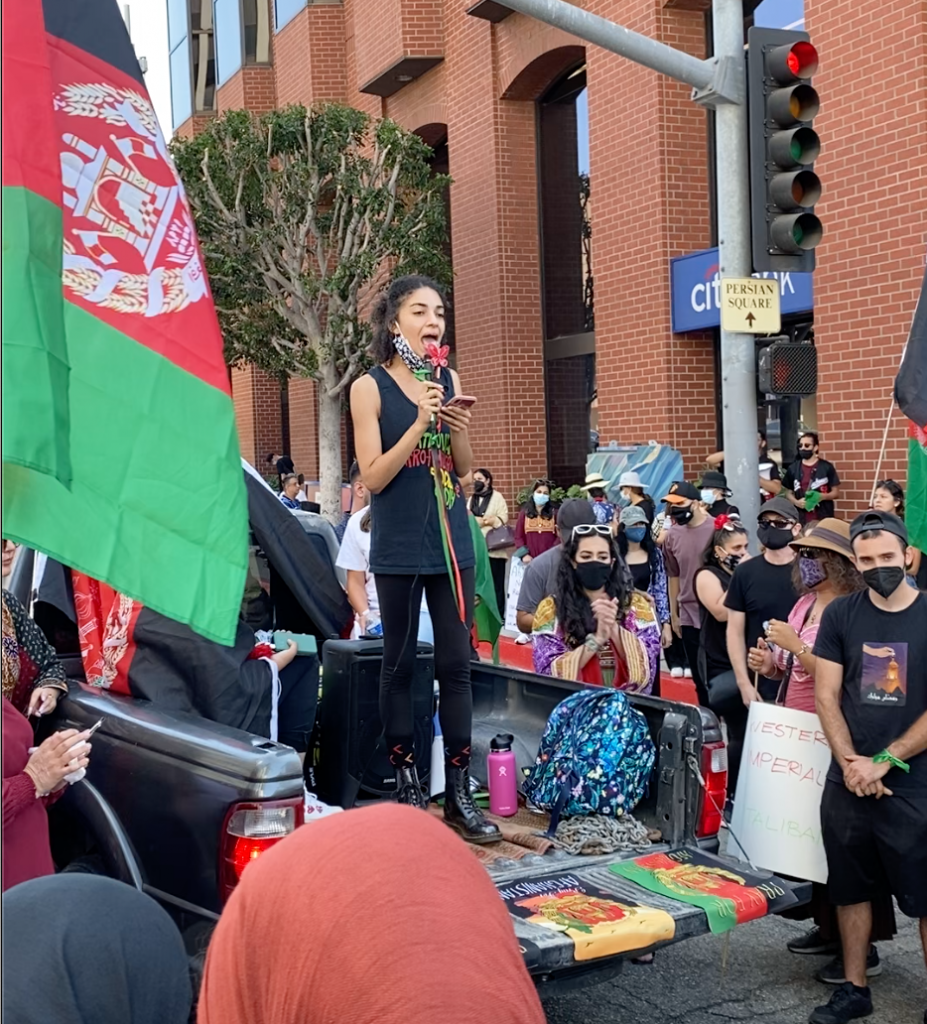
That’s why we do what we do. Maybe this person didn’t think that the Armenian community stood with him, but now he knows that at least there are some of us who do.
I think people tend to discount actions like that, because they think, well, what did it actually achieve? What are the quantifiable metrics of this action? With many actions, you won’t immediately see results and you won’t get any sort of instant gratification. That’s not what activism or organizing should be about. If that’s what you’re focused on, you’re going to be repeatedly disappointed.
What I love about Yerazad is we know that this is a sustained effort. Our big goal is a regenerative agriculture project that we want to bring to Armenia and Artsakh. We want to help Armenian women by creating jobs and having more local agriculture that’s sustainable for the land. But again, we know it’s not going to happen overnight.
Everything we do, we take a lot of care with, whether it’s that project, or even if it’s one of our infographics or posts, we want to make sure that everyone we have is on board. When we’re talking about other communities, we try to make sure that we consult people in those communities to make sure that we are aware of all of the facts and details and are being as culturally specific as we can. I love that because too often we are so pushed to just get things out there as fast as possible.
AC: Yeah, I love that you brought up that process of slow and thoughtful work because I think it is sometimes undervalued. I’m so interested to see how the regenerative agriculture project in Armenia goes because I think that the transnational connections, both in our diasporan communities but also between diaspora communities and those in Armenia are so important.
CM: We want to make sure that we aren’t just centering our hopes and our wants as diasporans on local Armenians who have already been doing a lot of work. We want to make sure that we are serving the people who are actually in Armenia and Artsakh, and we are making connections with the organizations and organizers who have already been on the ground there doing a lot of work.
AC: Totally agree. Is there anything we missed, or anything else you want to say?
CM: Just in the last year and a half I feel like I’ve already seen so much change. People are becoming more educated. Armenians who don’t fit the stereotypical mold of an Armenian now have more exposure.
It’s all about learning. Despite what people think, I’m not someone who just wants to cancel everybody. Especially with the work I do in theater and accountability, I really do want people to be held accountable for their actions. I want people who have done harm to acknowledge that harm, be accountable for that harm, and try to remedy the harm that they did. And then moving forward, to think about how they are going to make sure that that harm doesn’t happen again.
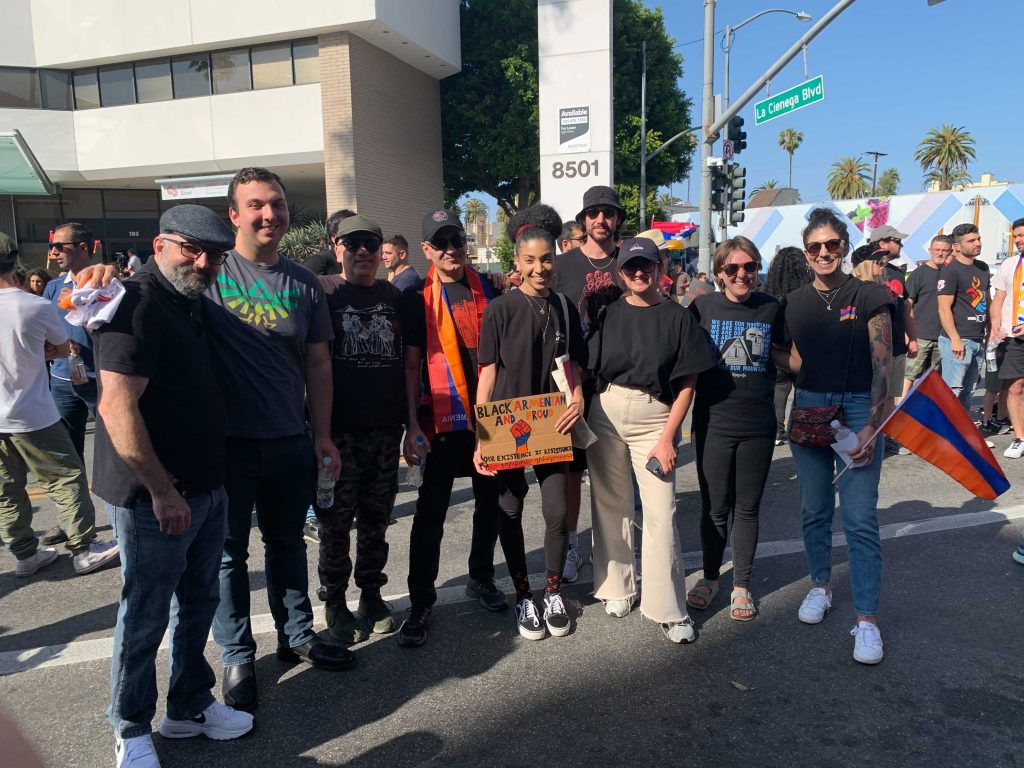
AC: I think it’s good that you brought it up too because it’s so true. It’s not about canceling people, it’s about accountability and people taking responsibility for the harm that they’ve done to others.
CM: I think all the trauma our community experienced last year was a wake up call for a lot of Armenians. There was massive growth, and I feel like as a whole, our community is so, so close. And I just really want us to get there and I think that we can. I still make that effort because I’m a very hopeful person. I always think people have the ability to change even when they show otherwise. But I’m going to keep trying until, you know, maybe one day it’ll be too much. Hopefully that day doesn’t come, but I’m gonna keep trying.
